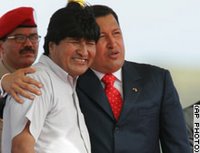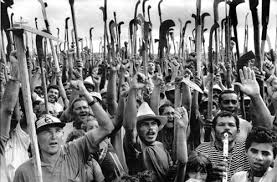Socialist Soulmates

CNN's website carried a report ["Morales, Chavez solidify ties," Reuters, January 3, 2006] last week that the "socialist soulmates," (to use Reuters' term) Chavez and Morales, seek to establish an "axis of good" in the words of the ever quotable Chavez.
"You know who is the axis of evil? Washington, they are the axis of evil, and their allies in the world who threaten, invade, who kill and assassinate, we are forming an axis of good," Chavez said.
Meanwhile Morales has been sparking controversy in his world tour because of his... wardrobe. A few choice excerpts from Annie Murphy's piece ["UNICEF Kid or Sans Culottes?: Evo Morales' Sweater," January 11, 2006]:
The controversy started in Spain; the sweater had given no offense to Chávez or Castro, but left various members of Spanish press and society appalled after Morales met with King Juan Carlos in, gasp, a red and blue wool pullover. (It probably doesn't help that Morales appears to be sticking his tongue out in some photos.)
Antonio Burgos of the newspaper "ABC" implied that even a Spanish doorman has better dress protocol and asked, "Is there no one who might lend Mr. Morales a dark suit in a pinch?" Like many indigenous Bolivian men Morales doesn't wear suits on formal occasions and instead favors sweaters and leather jackets.
***
But it's not even a sweater. It's a chompa, a hand knit indigenous pullover of alpaca wool considered appropriate and even refined in Bolivia, which is of course where Morales is from.
***
It's likely he isn't trying to insult kings and presidents, nor is he sending messages about poverty and revolution. Morales isn't President Bush or President Zapatero; when he puts on a pullover it isn't a PR move meant to reveal disregard or resolve, or even a regular guy. He's long been the latter. He's wearing his clothes. If only Morales's politics were scrutinized as closely as his wardrobe.
One can forgive the Western press for failing to understand this, given how unusual it is to see a politician deviating from the norm and not behaving as the product of a closely managed PR campaign.
However, Murphy does inject a note of caution, commenting that:
Even a superficial reading of Movement Towards Socialism (MAS) politics shows that Morales is hardly another Che. MAS is frequently moderate. For example, the party wants to renegotiate contracts with transnational petroleum companies rather than the confiscation and nationalization pursued by radical social movements such as the Regional Workers Central (COR) or the neighborhood collective (FEJUVE) of El Alto, the indigenous city above La Paz. When protest by those movements resulted in the resignation of Carlos Mesa last June, Morales wasn't even present. Radical social movements worry that Morales may ultimately fail them.
Similar sentiments were expressed by Daphne Eviatar, writing for The Nation in December (see my Dec. 24th post, Evo's Cage). Eviatar writes:
Thus every candidate in this election had to promise to "nationalize" the natural gas industry -- a word that suggests expropriation of private company property and sets off alarm bells with foreign investors, but which actually means a range of different things in this ideologically charged political culture.
***
A refusal to continue the coca eradication campaign would require the United States, under U.S. law, to vote against any Bolivian application for loans or grants from the World Bank, IMF or Inter-American Development Bank -- all critical to Bolivia's ability to finance its debt and fuel its economy. In effect, any attempt by the newly elected president to do exactly what Bolivians just elected him to do would marshal the forces of the international financial community against the Bolivian government and doom the country's already-precarious financial stability.
***
In Bolivia the United States is not only a symbol of foreign capital but of the bitter "war on drugs" that strong-armed Bolivia into accepting a U.S.-financed coca eradication campaign that even the World Bank has admitted bears responsibility for Bolivia's continued poverty.
Also of interest is Heinz Dieterich's ["Evo Morales, Communitarian Socialism, and the Regional Power Block," MRZine, 07/01/06]. This is Morales speaking of the socio-economic model of the MAS: "It is an economic model based on solidarity, reciprocity, community, and consensus. Because, for us, democracy is a consensus. In the community there is consensus, in the trade union there are majorities and minorities."
Another excerpt:
Alvaro Garcia Linera, ex-guerilla, prisoner, and Evo's vice-president, expresses it with clarity: "We are not against the free market. We are partisans of a socialist model with a Bolivian capitalism, where the earnings of the hydrocarbons would be transferred to other sectors, like the rural, where our people still work with the Egyptian plow that the Spaniards brought."



0 Comments:
Post a Comment
<< Home